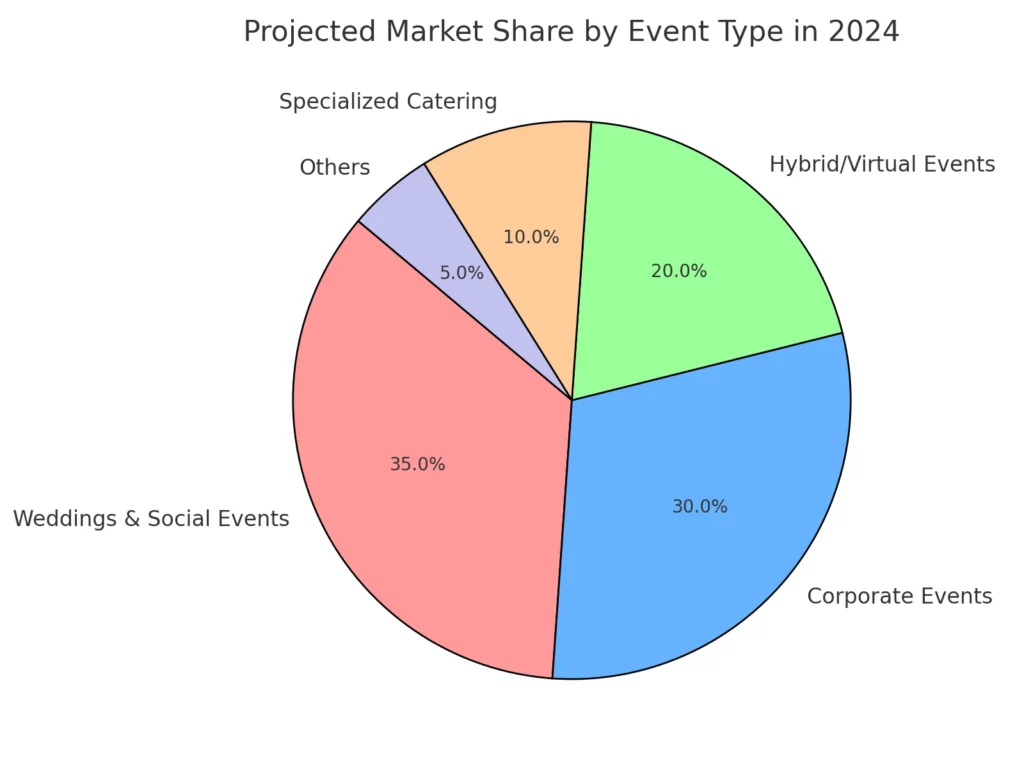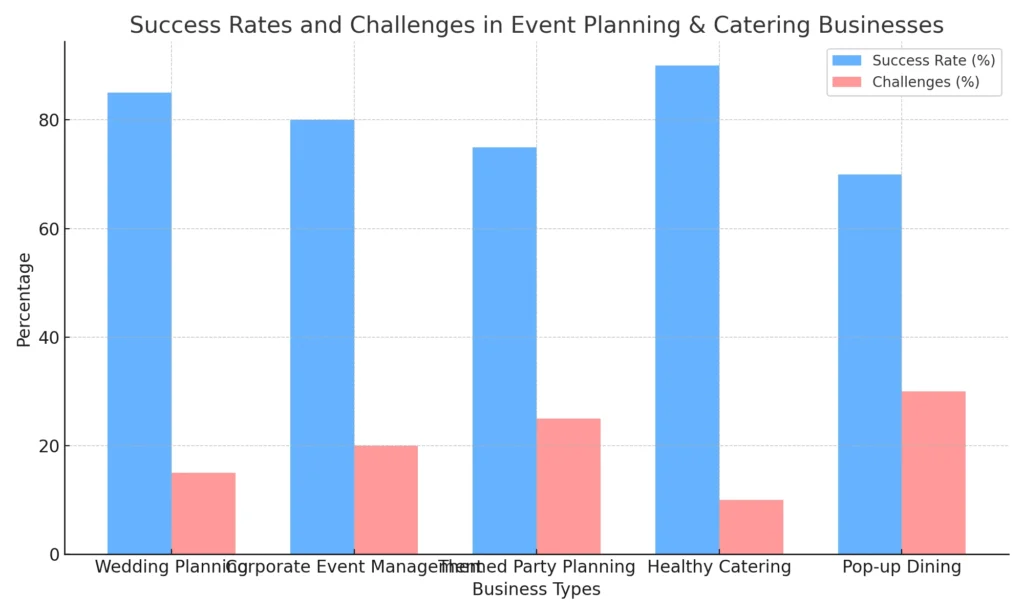In recent years, the event planning and catering industry has witnessed remarkable growth as more people seek customized experiences for personal and corporate events. Whether it’s a wedding, conference, or a pop-up dining experience, the demand for professional event planning and catering services continues to rise. This trend reflects a shift toward more experiential and memorable gatherings, where every detail—venue, food, ambiance, and entertainment—plays a crucial role in delivering value.
Entrepreneurs entering this industry have the opportunity to cater to diverse client needs by offering niche services or full-scale event management solutions. From intimate catering setups to large corporate events, the possibilities are vast. However, the success of these startups lies in creativity, excellent customer service, and the ability to adapt to new trends such as sustainability, hybrid events, and tech-enhanced experiences.
Why Choose Event Planning and Catering Business?
Event planning and catering businesses are thriving because they meet a growing demand for personalized, seamless experiences. Today, clients expect more than just an event—they want memorable moments that reflect their tastes and values. Whether it’s a corporate gathering, wedding, or community festival, people increasingly prefer expert planners and caterers who can transform ideas into well-executed experiences.

The flexibility of this business model is another reason it appeals to aspiring entrepreneurs. You can start small, offering niche services such as intimate wedding planning or luxury catering, and gradually expand into larger markets. Additionally, the rise of hybrid events—blending virtual and physical elements—creates new opportunities for startups to deliver creative solutions.
With trends leaning towards sustainable and experiential events, there’s plenty of space for innovation. Catering businesses focusing on organic, locally sourced ingredients, or event planners specializing in immersive activities are positioned for growth. Furthermore, technology is playing a major role—apps for bookings, AI-powered planning tools, and real-time event tracking have become essentials, making operations smoother and more efficient.
Also read: Top 10 Ideas for Waste Collection and Recycling Business Startups
Current Trends and Future Opportunities in Event Planning and Catering
The event planning and catering industry is evolving rapidly, with new trends reshaping how services are offered. Sustainability is at the forefront, with many businesses adopting eco-friendly practices, such as using biodegradable tableware and reducing food waste. Clients now prefer vendors who reflect their values, creating an opportunity for startups focused on green events.
Another significant trend is the rise of hybrid events—blending physical and virtual elements to engage wider audiences. From live-streamed weddings to interactive corporate conferences, hybrid events offer greater flexibility and cost-effectiveness. This shift opens doors for startups offering seamless digital and in-person experiences, powered by advanced event management tools.
Experiential events are also gaining momentum. Planners are integrating immersive elements like interactive displays, live performances, and themed dining experiences to make events unforgettable. Catering businesses are capitalizing on this by offering curated menus that reflect specific themes or culinary journeys.
Hybrid events are gaining momentum as they offer the flexibility to engage both in-person and virtual audiences. These events create opportunities for wider reach, sustainability, and increased attendance by blending online and physical experiences. Companies are now leveraging hybrid formats for conferences, weddings, and corporate gatherings, making this an essential trend for businesses to explore. You can learn more about hybrid event strategies from Cvent’s comprehensive guide here.
| Trend / Technology | Description | Impact on the Industry |
|---|---|---|
| Sustainability | Focus on eco-friendly practices like reducing waste and using biodegradable materials. | Attracts environmentally-conscious clients and builds brand trust. |
| Hybrid Events | Blends in-person and virtual components for wider audience engagement. | Increases flexibility and reduces logistical costs. |
| Experiential Elements | Uses immersive activities, interactive installations, and themed dining. | Enhances attendee experience and creates memorable events. |
| AI Integration | Automates planning tasks and personalizes guest experiences. | Boosts efficiency and improves customer satisfaction. |
| Customized Catering | Tailors menus based on event themes or dietary preferences. | Increases client satisfaction and differentiates services. |
Top 10 Ideas for Event Planning and Catering Business Startups
The event planning and catering industry offers exciting business ideas that cater to different niches. Whether you are passionate about weddings, corporate events, or pop-up dining experiences, there are numerous ways to create a successful startup in this field. Here are ten innovative ideas that align with the latest trends and provide opportunities for growth.
| Business Idea | Estimated Startup Cost | Key Resources Required | Target Market |
|---|---|---|---|
| Wedding Planning Services | $10,000 – $50,000 | Creative team, vendor partnerships | Couples planning weddings |
| Corporate Event Management | $15,000 – $60,000 | Event software, corporate contacts | Small to large businesses |
| Themed Party Planning | $5,000 – $25,000 | Party supplies, decorators | Families, social groups |
| Catering Business for Healthy Meals | $20,000 – $75,000 | Kitchen space, chefs, suppliers | Health-conscious consumers |
| Pop-Up Dining Experiences | $10,000 – $40,000 | Collaborating chefs, marketing | Food enthusiasts |
| Virtual Event Planning | $8,000 – $35,000 | Event software, streaming tools | Businesses, educational institutions |
| Event Consulting Services | $5,000 – $15,000 | Consulting tools, industry knowledge | DIY event planners |
| Event Décor and Rentals Business | $15,000 – $50,000 | Inventory, logistics team | Event planners, private clients |
| Event Photography and Videography | $10,000 – $45,000 | Professional equipment, skilled team | Weddings, businesses, individuals |
| Luxury Catering for Corporate Clients | $30,000 – $100,000 | Experienced chefs, premium suppliers | Corporations, luxury brands |
1. Wedding Planning Services
Creating customized weddings with unique themes and eco-friendly elements.
- Startup Requirements: Creative team, partnerships with venues and vendors
- Target Market: Couples planning weddings
- Estimated Cost: $10,000–$50,000
2. Corporate Event Management
Planning conferences, team-building activities, and product launches with both in-person and hybrid options.
- Startup Requirements: Event software, corporate partnerships
- Target Market: Small to large businesses
- Estimated Cost: $15,000–$60,000
3. Themed Party Planning
Organizing birthday parties or social events with immersive themes and interactive elements.
- Startup Requirements: Party supplies, decorators, entertainers
- Target Market: Families and social groups
- Estimated Cost: $5,000–$25,000
4. Catering Business for Healthy Meals
Offering meal catering with an emphasis on organic and healthy ingredients.
- Startup Requirements: Kitchen space, chefs, food suppliers
- Target Market: Health-conscious consumers and companies
- Estimated Cost: $20,000–$75,000
5. Pop-Up Dining Experiences
Organizing short-term, exclusive dining events at unique locations.
- Startup Requirements: Collaboration with chefs, marketing team
- Target Market: Food enthusiasts
- Estimated Cost: $10,000–$40,000
6. Virtual Event Planning
Specializing in online events like webinars, virtual conferences, and workshops.
- Startup Requirements: Event software, streaming tools
- Target Market: Businesses and educational institutions
- Estimated Cost: $8,000–$35,000
7. Event Consulting Services
Providing consultation for individuals or companies planning their own events.
- Startup Requirements: Industry knowledge, consulting tools
- Target Market: DIY event planners
- Estimated Cost: $5,000–$15,000
8. Event Décor and Rentals Business
Offering rental services for event décor and furniture.
- Startup Requirements: Inventory, delivery logistics
- Target Market: Event planners and private clients
- Estimated Cost: $15,000–$50,000
9. Event Photography and Videography Services
Providing photo and video coverage tailored to events.
- Startup Requirements: Professional equipment, skilled team
- Target Market: Wedding planners, businesses, and individuals
- Estimated Cost: $10,000–$45,000
10. Luxury Catering for Corporate Clients
Providing upscale catering services for high-profile business events.
- Startup Requirements: Experienced chefs, premium food suppliers
- Target Market: Corporations and luxury brands
- Estimated Cost: $30,000–$100,000
Real-World Examples
Successful event planning and catering businesses demonstrate how creativity, dedication, and excellent service can lead to growth. These companies often start with a small niche, gradually expanding by delivering exceptional customer experiences and building strong partnerships. Learning from their stories provides valuable insights for aspiring entrepreneurs.
One example is a boutique wedding planner who began with intimate weddings but expanded into luxury destination weddings over time. By creating unique themes and partnering with high-end vendors, they built a reputation that attracted affluent clients. Another success story involves a healthy catering service that started with small corporate lunches and eventually grew into a large-scale operation, providing meal plans and catering for major conferences. Their focus on organic ingredients and excellent presentation helped them stand out in a competitive market.
A catering business specializing in pop-up dining events offers another inspirational model. This company gained popularity by organizing short-term dining experiences at exotic locations, generating buzz on social media and attracting food lovers. Their ability to create unique, immersive experiences gave them a strong competitive edge.

Mistakes to Avoid When Starting an Event Planning or Catering Business
Starting an event planning or catering business can be exciting, but many entrepreneurs face challenges along the way. Knowing what pitfalls to avoid can save time, money, and effort, helping the business grow smoothly.
One of the most common mistakes is poor budgeting. New businesses often underestimate costs, leading to cash flow problems. It’s crucial to have a realistic budget covering everything from marketing expenses to equipment and supplies. Additionally, inefficient time management can lead to delayed events and lost clients. Entrepreneurs need to develop clear timelines and stick to schedules to maintain a professional reputation.
Another mistake is neglecting customer experience. Happy clients are the key to growth, and word-of-mouth referrals are invaluable in this industry. Businesses should focus on excellent communication, attention to detail, and personalized services to build long-term relationships.
Ignoring market trends is also a critical error. Successful businesses keep up with evolving trends like sustainable practices and hybrid events. Staying relevant ensures that your offerings meet current customer expectations.
Lastly, poor vendor relationships can disrupt operations. Building strong partnerships with reliable vendors ensures smooth event execution, whether for decorations, venues, or catering supplies.
Investing in the right event management software is crucial to avoid operational bottlenecks. Tools for booking management, guest tracking, and real-time event updates can streamline processes and enhance client satisfaction. Relying on outdated tools or manual management can lead to costly errors and missed opportunities. Explore advanced event management solutions tailored for growing businesses on Eventbrite’s platform here.
| Mistake | Impact on Business | Preventive Measures |
|---|---|---|
| Poor Budgeting | Cash flow problems and project delays | Create a realistic budget with contingency funds |
| Inefficient Time Management | Missed deadlines and loss of clients | Develop timelines and use scheduling tools |
| Neglecting Customer Experience | Negative reviews and loss of repeat business | Focus on personalized service and effective communication |
| Ignoring Market Trends | Outdated services that fail to attract customers | Stay updated on trends like sustainability and hybrid events |
| Weak Vendor Relationships | Disruptions in event execution | Build strong partnerships with reliable vendors |
Why Trust Miracuves Solutions for Your Next Project?
Choosing the right partner for your event planning or catering business can make all the difference. Miracuves Solutions offers expertise that helps businesses in this industry grow faster, smarter, and more efficiently. With a deep understanding of both event management and technology, Miracuves Solutions provides tailor-made digital solutions to streamline operations and enhance customer experiences.
Our company specializes in developing custom event management apps that simplify bookings, scheduling, and guest management. We understand the importance of speed and affordability, completing projects up to 30 times faster than the industry standard and at 10% of the global average cost. With Miracuves Solutions, businesses can reduce operational complexity and focus more on delivering excellent events and catering services.
Miracuves Solutions stands out because of its commitment to customer success. Our track record includes collaborations with startups and established businesses, helping them create seamless digital platforms that drive growth and engagement. Whether you need a mobile app to manage event bookings or tools to optimize catering logistics, we have the expertise to meet your needs quickly and effectively.
Conclusion
The event planning and catering industry offers a world of opportunities for creative entrepreneurs. From weddings and corporate events to healthy catering and pop-up dining experiences, the possibilities are endless. Success in this field depends on careful planning, a keen understanding of market trends, and the ability to provide exceptional customer experiences. By choosing the right niche, building strong vendor relationships, and leveraging modern technology, businesses can carve out their place in this competitive industry.
Aspiring entrepreneurs must stay focused on delivering value and maintaining high standards, as customer satisfaction plays a crucial role in growth. With careful budgeting, efficient management, and a willingness to adapt to trends, your event planning or catering business can thrive and stand out.
FAQs
How much investment is needed to start an event planning business?
The initial investment depends on the scale, but most startups can begin with $5,000 to $50,000, covering essentials like marketing, staff, and equipment.
What are the essential tools for a catering business?
Key tools include kitchen equipment, food storage solutions, delivery vehicles, and management software for orders and inventory tracking.
How do I find clients for my event planning startup?
Building a portfolio, networking with vendors, leveraging social media, and offering referral incentives are effective ways to attract clients.
What legal permits are required for a catering business?
Common requirements include food safety certifications, health permits, and business licenses based on local regulations.
How can I scale an event planning business efficiently?
Focus on automation tools, build a reliable vendor network, and consider expanding into specialized services like destination events or hybrid conferences.







